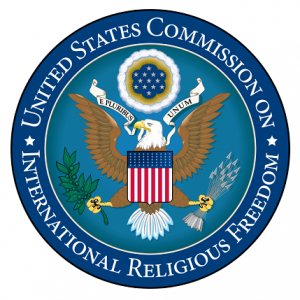On the Hill: Religious Freedom and Blasphemy Laws Get Renewed Attention

This week, I attended several events on Capitol Hill focused on international and domestic religious freedom, an issue of importance to theists and nontheists alike. The issue of religious freedom and blasphemy has made headlines for years with the ongoing murders of atheist bloggers around the world, and with the recent announcement by the Irish police that humanist Stephen Fry was under investigation for blasphemy after labeling God an “utter maniac.”
A meeting of the International Panel of Parliamentarians for Freedom of Religion or Belief was the first event I attended and included legislators from around the world who work on religious freedom issues. Led by Baroness Elizabeth Berridge, this network of politicians is seeking to create a similar network in the US in order to foster cooperation by politicians internationally on religious freedom issues, such as the freedom to practice or not practice a particular faith free from either governmental or societal violence.
Following this meeting, I attended an event hosted by the US Commission on International Religious Freedom (USCIRF), which was established under the International Religious Freedom Act of 1998. The commission had just released its 2017 Annual Report on Religious Freedom, in which the commission is described as
an independent, bipartisan US government advisory body, separate from the State Department, that monitors religious freedom abroad and makes policy recommendations to the president, Secretary of State, and Congress. USCIRF bases these recommendations on its statutory mandate and the standards in the Universal Declaration of Human Rights and other international documents.
Commissioners at the meeting reviewed the ongoing global religious freedom situation and discussed which countries would be labeled as Countries of Particular Concern (CPC)s, and which groups would be labeled as Entities of Particular Concern (EPC)s. The International Religious Freedom Act requires the US government to designate as a CPC any country whose government engages in or tolerates particularly severe religious freedom violations that are systematic, ongoing, and egregious. Receiving a CPC designation can lead to a variety of consequences, from diplomatic actions to sanctions of an entire country or specific individuals. And while IRFA does not require the commission to designate EPCs, the commission felt such an action was necessary given the rise of non-state actors such as ISIS that commit violations of religious freedom over those they govern.
While I was glad to see discriminatory countries like Saudi Arabia, Pakistan, and Russia included on the CPC list, I was disheartened to note that, yet again, Bangladesh is merely listed as a monitored country, and not a Country of Particular Concern. This is concerning because the Bangladeshi government has stood by while attacks on bloggers have continued, all while persecuting religious minorities and maintaining restrictive religious freedom laws.
USCIRF is continuing to monitor the situation in Bangladesh, and until an accurate designation is made, or until the Bangladeshi government cleans up its act and protects religious freedom for all of its citizens, the American Humanist Association will continue to advocate for listing Bangladesh as a CPC.
